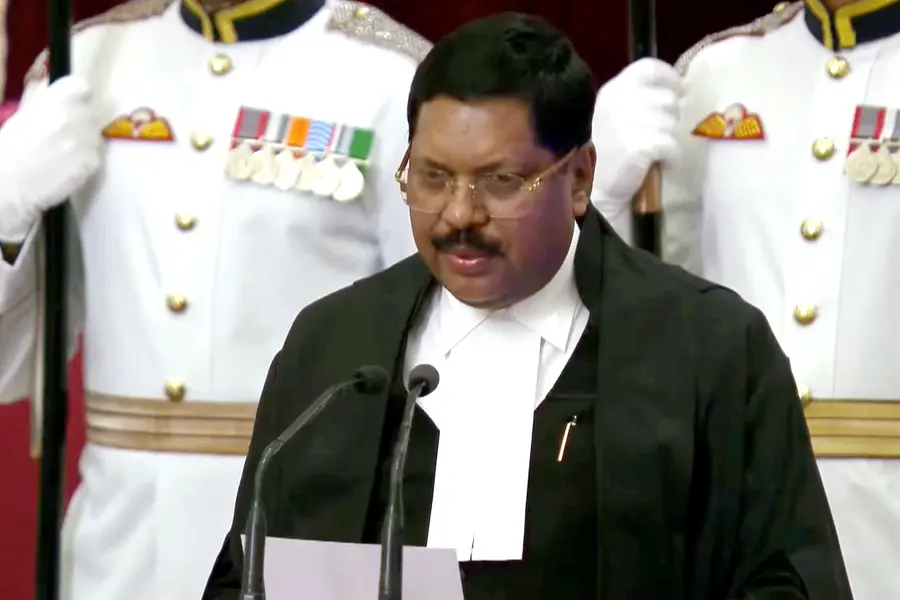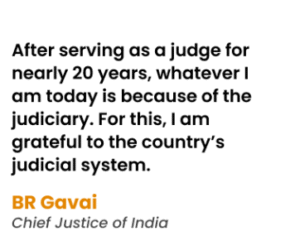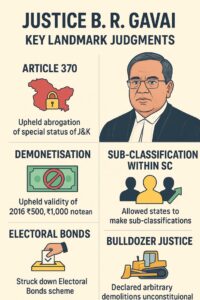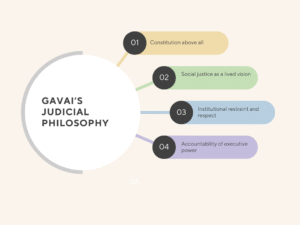As Justice Surya Kant steps into the role of Chief Justice of India following the departure of Justice Bhushan Ramkrishna Gavai, it seems apt to pause and reflect on Gavai’s remarkable journey — a life of law, service, and deep constitutional conviction.

Early Life and Judicial Journey
Born on 24 November 1960 in Amravati, Maharashtra, Justice Gavai emerged from a family deeply influenced by the Ambedkarite social movement. His father, R. S. Gavai, was a prominent public figure and social reformer.
Gavai began his legal practice in 1985, with a keen interest in constitutional and administrative matters. Over the years, he served as standing counsel for major public bodies and later became Additional Public Prosecutor and then Public Prosecutor for Maharashtra.
His judicial career formally began in 2003 with his appointment as an Additional Judge of the Bombay High Court, Nagpur Bench. By 2005, he became a permanent judge of the Bombay High Court.
On 24 May 2019, he was elevated to the Supreme Court. Finally, in May 2025, he became the 52nd Chief Justice of India, making history as the first Buddhist and only the second Dalit to assume the office. Though his tenure as CJI was short due to his retirement in November 2025, his impact was enduring.

Landmark Judgments and Judicial Philosophy
Justice Gavai authored nearly 300 judgments during his time in the Supreme Court and sat on close to 700 benches, including some of the most significant Constitution Benches of recent times. His judicial approach can be understood through the major decisions he participated in or authored:
1. Article 370 – Constitutional Reorganisation of Jammu & Kashmir
He was part of the Constitution Bench that upheld the abrogation of Article 370, agreeing that Parliament and the President possessed the constitutional authority to reorganise the special status of Jammu & Kashmir.
2. Demonetisation Verdict
Justice Gavai wrote the majority judgment upholding the 2016 demonetisation exercise. His reasoning focused on procedural legitimacy, institutional consultation, and judicial restraint in economic matters.
3. Electoral Bonds Case
He was a member of the bench that struck down the Electoral Bonds Scheme for violating citizens’ right to information and undermining electoral transparency.
4. Sub-Classification Within Scheduled Castes
In a historic 7-judge bench ruling, he supported allowing states to make sub-classifications within the Scheduled Castes to ensure that the most marginalised sections receive the intended benefits of affirmative action.
5. “Bulldozer Justice” and Arbitrary Demolitions
Justice Gavai took a firm stand against extra-legal demolitions carried out by state authorities. He emphasised due process, mandatory notice, and protection against discriminatory executive action.
6. Free Speech of Public Functionaries
He was part of the bench that ruled that elected representatives or ministers cannot be subjected to additional speech restrictions beyond what the Constitution already prescribes.
7. Arbitration and Contract Law
In a significant decision, he held that unstamped or insufficiently stamped contracts can still be taken to arbitration, as stamping issues are curable and not grounds to invalidate arbitration agreements.
8. “Swadeshi Interpretation” Approach
One of Gavai’s unique jurisprudential contributions was his call for a “swadeshi interpretation” of the Constitution — preferring Indian precedents and constitutional traditions over foreign jurisprudence, especially in Constitution Bench matters.
Judicial Philosophy: A Distinct Voice
Justice Gavai’s philosophy can be summarised in four key themes:
1. Constitution Above All
He consistently emphasised that the Constitution is the nation’s moral compass. His judgments repeatedly stressed constitutional supremacy, the rule of law, and institutional balance.
2. Social Justice as a Lived Vision
As someone shaped by Ambedkarite ideals, Gavai believed in substantive equality. His stance in the sub-classification judgment reflected his commitment to ensuring that reservation benefits reach the truly disadvantaged.
3. Institutional Restraint and Respect
In matters such as demonetisation, he insisted on judicial restraint and deference to expert bodies, provided due process was followed.
4. Accountability of Executive Power
His rulings on anti-encroachment drives and arbitrary demolitions reinforced the principle that state power cannot be exercised punitively or without fair procedure.
Reforms and Institutional Legacy
Even during his brief tenure as CJI, Justice Gavai took significant steps toward inclusivity in the judiciary:
-
His collegium cleared 24 OBC and minority candidates for elevation to High Courts.
-
He advocated for stronger judicial infrastructure and efficient disposal of pending cases.
-
His tenure was marked by a commitment to greater transparency and equitable representation.
Some Controversies
Justice Gavai, like any influential jurist, drew criticism:
-
He acknowledged that during his collegium tenure, no woman judge was elevated to the Supreme Court, attributing this to a lack of consensus.
-
In certain PILs, he was known for blunt remarks which sparked debate, although many appreciated his sincerity.
-
His “swadeshi interpretation” approach drew mixed reactions, with some praising it as rooted constitutionalism and others viewing it as restrictive.
Farewell and Final Reflections
At his farewell, Justice Gavai described himself as a “lifelong student of the Constitution.” His humility and commitment to justice resonated deeply with the Bar and Bench.
His story is also one of representation, a reminder that the Indian judiciary can reflect the diversity and aspirations of the nation.
Justice B. R. Gavai: Good, bad, or simply unforgettable?
Perhaps the answer isn’t meant to be absolute. His tenure was marked by bold stands, contentious moments, and a steady commitment to constitutionalism – a mix that resists easy labels.As Justice Gavai steps away from the Bench and Justice Surya Kant takes over, one question remains for every reader, scholar, and citizen of law:
How should we remember Justice B. R. Gavai? As a courageous reformer, a cautious conservative, a constitutional nationalist, or something entirely different?
The legacy is now in your hands.
So ponder: in the long arc of Indian jurisprudence, where does Justice Gavai truly stand?



